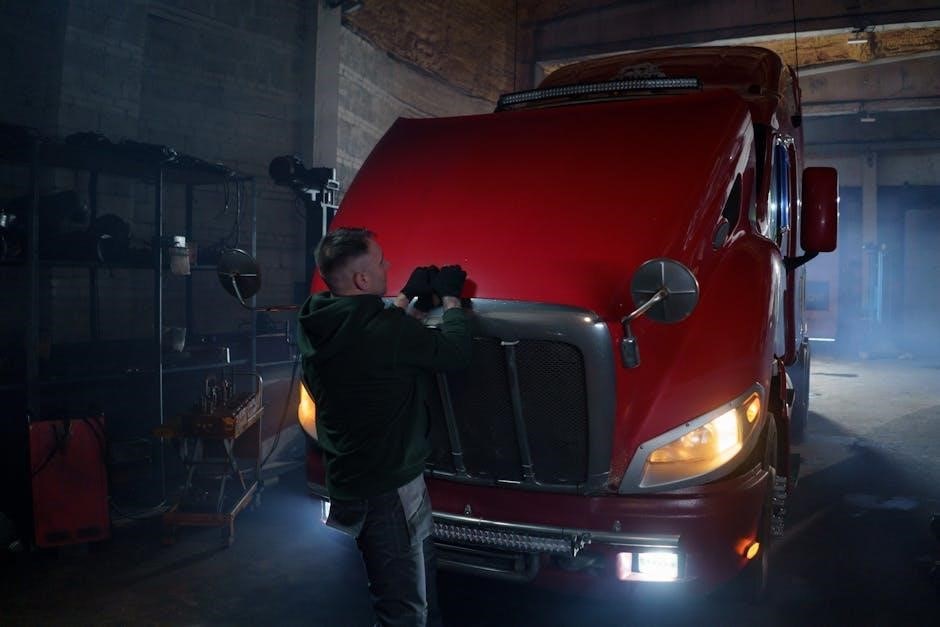Welcome to the Colorado Commercial Driver License (CDL) Manual, your essential guide to obtaining and maintaining a CDL in Colorado. This manual provides detailed information on safety regulations, traffic laws, and best practices for commercial drivers. It is designed to help you prepare for the CDL tests and ensure compliance with state and federal requirements. Whether you’re a new applicant or an experienced driver, this manual is your key resource for success on the road.
1.1 Purpose and Importance of the CDL Manual
The Colorado CDL Manual serves as a comprehensive guide for commercial drivers, outlining state and federal regulations, safety standards, and best practices. Its purpose is to ensure drivers are well-prepared for CDL tests and maintain safe driving habits. The manual is essential for understanding traffic laws, vehicle inspections, and hazardous materials handling. It is regularly updated to reflect current rules and requirements, making it a vital resource for all commercial drivers in Colorado.
1.2 Overview of the Colorado DMV and CDL Program
The Colorado Department of Motor Vehicles (DMV) oversees the CDL program, ensuring compliance with federal and state regulations. The program is designed to train and license commercial drivers, promoting road safety and efficient transportation. The DMV offers resources like the CDL manual, online study guides, and practice tests to support applicants. Regular updates and improvements ensure the program remains effective and aligned with industry standards, benefiting both drivers and the public.
Eligibility Requirements for Obtaining a CDL in Colorado
To obtain a CDL in Colorado, you must be at least 21 years old for interstate driving or 18 for intrastate. You must be a Colorado resident, pass a medical certification, and meet all federal and state requirements. Refer to the Colorado CDL Manual for detailed eligibility criteria.
2.1 Age and Residency Requirements
To apply for a CDL in Colorado, you must be at least 21 years old for interstate driving or 18 years old for intrastate operations. You must also be a Colorado resident and provide proof of residency, such as a utility bill or lease agreement. Non-residents are not eligible for a Colorado CDL. Ensure you meet these criteria before starting the application process.
2.2 Medical Certification and DOT Physical
All Colorado CDL applicants must pass a DOT physical examination conducted by a certified medical examiner. The exam assesses your ability to safely operate a commercial vehicle. You’ll receive a Medical Examiner’s Certificate, which must be submitted with your CDL application. The certification is valid for up to two years, depending on health conditions. Maintaining a valid medical certification is crucial to keep your CDL active.

Types of Commercial Driver Licenses (CDLs) in Colorado
Colorado offers Class A, B, and C CDLs, each catering to different vehicle types and weights. Endorsements and restrictions further customize licensing based on specific driving requirements.
3.1 Class A, B, and C CDLs
Colorado offers three CDL classes: Class A, B, and C. Class A CDLs cover combination vehicles with a trailer over 10,001 lbs. Class B licenses are for heavy straight vehicles, while Class C CDLs are for smaller vehicles, including passenger transport and HazMat with endorsements. Each class is tailored to specific vehicle types and weights, ensuring drivers are qualified for their intended operations.
3.2 Endorsements and Restrictions
Colorado CDLs include various endorsements and restrictions. Endorsements like H (HazMat), N (tank vehicles), and P (passenger transport) require additional testing. Restrictions, such as E (automatic transmission) and L (air brake prohibition), limit driving privileges. The manual explains how to obtain endorsements and the impact of restrictions on your commercial driving career. Understanding these is crucial for compliance.
Study Materials and Resources
The Colorado CDL Manual is the primary study resource, offering detailed rules, signs, and regulations. Online guides, practice tests, and DMV resources are also available.
4.1 The Official Colorado CDL Manual
The Official Colorado CDL Manual is a comprehensive guide tailored for commercial drivers. It covers essential topics like road signs, traffic laws, and safety protocols. Available in both digital and print formats, the manual is regularly updated to reflect current regulations. Drivers can access it on the Colorado DMV website or at local DMV offices. It’s the primary resource for CDL preparation and compliance.
4.2 Online Study Guides and Practice Tests
Supplement your CDL preparation with online study guides and practice tests. These resources offer interactive learning tools, including audio-based study materials and AI-driven support. Practice tests mimic real exam formats, helping you assess readiness. Many platforms provide immediate feedback and detailed explanations. Access these resources anytime, tailoring your study schedule to fit your needs. They enhance understanding and confidence, ensuring you’re well-prepared for the Colorado CDL exams.

The CDL Application Process in Colorado
To apply for a CDL in Colorado, complete the application, submit required documents, and pay the applicable fees. Visit the DMV website for detailed instructions and updates.
5.1 Completing the Application
To begin the CDL application process in Colorado, download and complete the application form from the Colorado DMV website. Ensure all information is accurate and legible. Be prepared to provide personal and employment details, as well as certify eligibility for the type of CDL you are applying for. Double-check all sections before submission to avoid delays. This step is crucial for a smooth application process.
5.2 Required Documents and Fees
Applicants must provide proof of identity, residency, and legal status. Required documents include a valid passport, birth certificate, or Social Security card, along with utility bills or lease agreements. The CDL application fee varies by class and endorsements, with additional costs for skills tests. Payment can be made via cash, credit, or check. Ensure all documents are up-to-date and fees are paid to avoid processing delays. Check the DMV website for the most accurate fee schedule.
Medical Requirements for CDL Holders
CDL holders must pass a DOT physical exam every 24 months to ensure fitness for commercial driving. Maintain valid medical certification to avoid license disqualification.
6.1 DOT Medical Examination
A DOT medical examination is required for all CDL applicants and must be conducted by a certified medical examiner. The exam includes a review of medical history, vision and hearing tests, blood pressure check, and physical assessment. Drivers must meet federal standards to qualify for a medical certificate, which is valid for up to 24 months. This ensures commercial drivers are fit to operate safely.
6.2 Maintaining Medical Certification
To maintain CDL eligibility, drivers must keep their medical certification up to date. Certification typically expires every 24 months, requiring periodic medical exams. Drivers must self-certify their operating category with the DMV and update their medical status. Failing to renew certification can result in CDL disqualification. Regular check-ups ensure ongoing fitness for duty, aligning with federal safety standards and preventing license suspension.
CDL Testing and Exams
CDL testing ensures drivers meet Colorado’s safety standards. The process includes knowledge and skills exams, covering traffic laws, signs, and vehicle operation to guarantee competence behind the wheel.
7.1 Knowledge Tests
The Colorado CDL knowledge tests assess a driver’s understanding of traffic laws, safety regulations, and vehicle operation. The tests are available in English and Spanish, ensuring accessibility for all applicants. They cover essential topics such as road signs, safe driving practices, and specific endorsements like hazardous materials or passenger transport. Passing the knowledge test is the first step toward obtaining a CDL permit, allowing drivers to proceed to the skills test phase.
7.2 Skills Tests
The Colorado CDL skills test evaluates a driver’s ability to operate a commercial vehicle safely. It includes three parts: a pre-trip vehicle inspection, basic vehicle control maneuvers, and on-road driving. The inspection tests knowledge of safety checks, while the control and driving sections assess actual driving skills. Applicants must use the type of vehicle for which they are seeking a CDL. Passing this test demonstrates proficiency in handling a commercial vehicle in real-world conditions.

Fees and Costs Associated with CDL in Colorado
Obtaining a CDL in Colorado involves various fees, including licensing, endorsements, and skills tests. Costs vary based on the type of license and additional certifications required.
8.1 Licensing Fees
In Colorado, CDL licensing fees range from $50 to $100, depending on the class of license and endorsements. Class A, B, and C licenses have varying costs, with endorsements adding extra fees. Renewal fees are typically lower, around $50. Additional costs may include skills test fees and medical certification expenses. For the most accurate pricing, check the Colorado DMV website or visit a local office.
8.2 Additional Costs for Endorsements and Tests
Beyond the base licensing fee, endorsements for HAZMAT, tanker trucks, or multiple trailers incur additional costs, typically ranging from $10 to $50 each. Skills tests for vehicle inspection, basic control, and road driving may add $100 to $200. Fees for medical certifications and vision tests are also required. These costs vary, so check the Colorado DMV website for the most current pricing and requirements.

Restrictions and Disqualifications
CDL holders face restrictions based on violations, such as DUI convictions or reckless driving, which can lead to temporary or permanent disqualification. Major offenses result in mandatory disqualifications, while lesser violations accumulate points, potentially leading to license suspension. Understanding these rules is crucial for maintaining driving privileges and ensuring road safety.
9.1 Violations and Penalties
Commercial drivers in Colorado face strict penalties for violations, including fines, license suspension, or disqualification. Alcohol-related offenses, such as driving with a blood alcohol content (BAC) of 0.04% or higher, result in severe consequences. Reckless driving, speeding, and other serious violations can lead to increased penalties, especially for repeat offenses. Understanding these rules is essential to avoid legal and financial repercussions while maintaining CDL privileges.
9.2 Impact of Disqualifications on CDL Holders
Disqualifications from CDL privileges severely impact commercial drivers, often leading to job loss and financial hardship. Penalties may include license suspension or revocation, especially for serious offenses like DUI or reckless driving. Repeat violations can result in lengthy disqualifications, affecting career prospects. CDL holders must adhere to strict compliance standards to avoid these consequences and maintain their professional driving capabilities.
Additional Resources and Support
Explore additional resources such as Colorado DMV office locations, community organizations, and professional groups dedicated to supporting CDL holders in Colorado.
10.1 Colorado DMV Office Locations
Colorado DMV offices are strategically located across the state, offering convenient access to CDL services. Key locations include offices in Longmont, Cañon City, Delta, Lakewood, Meeker, Salida, and Steamboat Springs. These offices provide essential services such as CDL applications, knowledge tests, and license issuance. Visit the Colorado DMV website for a full list of locations and to confirm office hours. This ensures you can plan your visit efficiently and access the resources you need.
10.2 Community and Professional Organizations
Community and professional organizations play a crucial role in supporting Colorado CDL holders. Groups like the Colorado Trucking Association and local driver advocacy organizations provide resources, training, and networking opportunities. These organizations often collaborate with the Colorado DMV to ensure drivers stay updated on regulations and best practices. They also offer assistance with maintaining certifications and resolving issues related to commercial driving. Engaging with these organizations can enhance your career and compliance in the industry.




